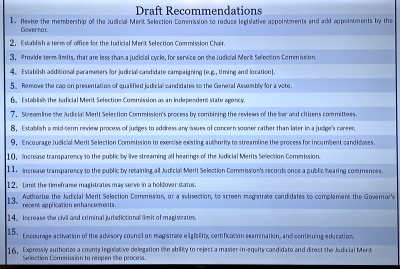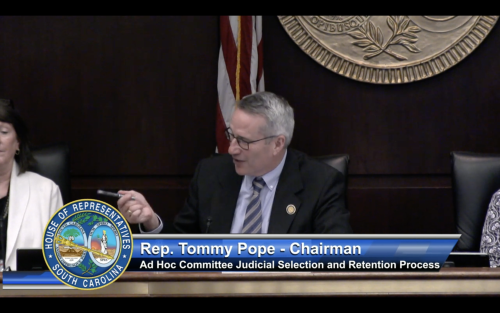SC House Making Progress on Judicial Reform
This week, the South Carolina House of Representatives took a substantial step toward judicial reform in the Palmetto State.
Judicial reform has been a hot topic in the state for the last few years, as investigative journalism and the high-publicity Murdaugh trial have turned voters’ and legislators’ attention to the way South Carolina’s judges are selected. As a refresher, South Carolina is one of only two states where the majority of judges are elected by the legislature. We do this through the Judicial Merit Selection Committee (JMSC), a 10-member screening committee where 5 members are appointed by the Speaker of the House, 3 appointed by the Senate Judiciary Chairman, and 2 appointed by the Senate President. Many have expressed concern about potential corruption in this process, and it is undoubtedly important to maintain public confidence in the state judiciary system. To that end, legislators and the Governor alike have promised that judicial reform is a top priority for the 2024 legislative session.
Last fall, Speaker Murrell Smith created the House Ad Hoc Committee to Examine the Judicial Selection and Retention Process in SC to dive deep into the topic. The 13-member committee is composed of bipartisan legislators from a variety of professional backgrounds and is chaired by Speaker Pro Tem Tommy Pope (pictured above). Over the last few months, the committee took testimony from various stakeholders in the state’s judicial system, from members of the public to lawyers to victims’ advocates to sitting judges and more, with the goal of narrowing down potential reforms for a bill to be introduced in early February. On January 31, after months of work and numerous public hearings, the committee sat down to finalize their recommendations for a comprehensive judicial reform bill.
The Ad Hoc Committee pretty firmly concluded that it did not want to recommend changes to the way the state constitution structures the judiciary; rather, it aimed to identify changes in the code of laws for, in Speaker Smith’s words, “the system for selecting [judges] and holding them accountable.” Palmetto Promise applauds this decision; we are strongly in favor of maintaining the Judicial Merit Selection Committee system and believe it is the most effective and fair way to select judges. Professor Wilcox at the University of South Carolina School of Law notes that since the advent of the JMSC system, the number of legislators appointed to judgeships by their cronies in the General Assembly dropped dramatically. However, we do agree that the JMSC in its current state needs reform, and we support plans to increase transparency, incorporate more executive branch involvement, and restore public confidence in the JMSC system.
While the Ad Hoc Committee’s final report is still being compiled, it voted to approve 16 broad draft recommendations for inclusion in a report to the Speaker, which will hopefully turn into a final piece of legislation. Palmetto Promise is delighted to see so many of these recommendations (marked with stars below) align directly with our “Judging the Judges” report from 2021 and our subsequent report on magistrate reform.
Here are the draft recommendations approved by the Ad Hoc Committee and information about what each proposal means:

1.* Revise the membership of the Judicial Merit Selection Commission to reduce legislative appointments and add appointments by the Governor.
This would add more accountability and a broader set of voices (including fewer lawyer-legislators) to those who decide which judicial candidates advance to the General Assembly (see recommendation #3 of Judging the Judges). The exact composition is still being hammered out, but we are glad to see JMSC expansion on the table.
2. Establish a term of office for the JMSC Chair; and 3.* Provide term limits, that are less than a judicial cycle, for serving on the JMSC.
JMSC member and chair terms being, for example, 4 years, when a judgeship lasts 6 years ensures that a judge does not appear before the same JMSC member (particularly lawyer-legislators) twice, so they do not feel pressured to make certain case decisions with reelection in mind (see recommendation #3 of Judging the Judges). While we know that nearly all our judges and lawyer-legislators do act with utmost integrity, term limits like this will help avoid any appearance of impropriety or potential for corruption.
4. Establish additional parameters for judicial candidate campaigning (e.g. timing and location).
This point answers concerns raised by former judicial candidates, who have said they have to attend often redundant campaign events when running for a seat elected by the General Assembly. If we are introducing more judicial candidates to the process (as proposed below), better structure and parameters for campaigning are necessary to protect the ethics of the process and the time of both candidates and legislators.
5.* Remove the cap on presentation of qualified judicial candidates to the General Assembly for a vote.
Currently, the JMSC selects at most three candidates for a judgeship to advance to the General Assembly for a vote. This means that perfectly qualified candidates can be rejected simply because they do not have the same connections on the JMSC that other candidates do. We appreciate the concerns raised by Rep. Caskey about the logistical feasibility of advancing all qualified candidates, and thus, like we suggested in Judging the Judges recommendation #1, we support raising that cap to five candidates.
6. Establish the JMSC as an independent state agency.
This would ensure that the JMSC has adequate staff to do its work well and does not share building space or staff with the General Assembly. Greater separation between the General Assembly and the JMSC is key to making it a more impartial, standalone institution.
7. Streamline the JMSC’s process by combining the reviews of the bar and citizens committee.
Right now, judicial candidates go through often-redundant reviews by different committees, like the SC Bar (which voluntarily does such reviews) and the Citizens Committee on Judicial Selection (which is statutorily required). Combining and/or streamlining these review processes will make judicial candidacy more accessible and less intimidating. Furthermore, Palmetto Promise would like to see greater independence of the Citizens Committee, as it is all appointed by members of the JMSC.
8.* Establish a mid-term review process of judges to address any issues of concern sooner rather than later in a judge’s career.
South Carolina judges are elected by terms, not appointed for life like the US Supreme Court. If someone identifies misconduct or has ethical concerns about a judge, those problems should be addressed expediently and transparently, not delayed for years until the end of a judge’s term. Establishing a regular review process for judges, perhaps through the JMSC or the SC Supreme Court, will help issues reach a quick resolution and help citizens feel like their concerns are heard. (see Judging the Judges recommendation #4, where we called for greater disclosure of ethical complaints against judges).
9. Encourage JMSC to exercise existing authority to streamline the process for incumbent candidates.
This recommendation is really about increasing efficiency within the JMSC, so that the majority of the committee’s time can be spent reviewing judges who have ethical/behavior/financial complaints, rather than those who do not have any reported problems.
10. Increase transparency to the public by live streaming all hearings of the JMSC.
This proposal was raised by several speakers in the Committee’s public hearings, and we cannot think of a better way to help increase public confidence in the JMSC process and integrity. Sunlight in politics is an excellent remedy to insider dealings (or accusations thereof).
11. Increase transparency to the public by retaining all JMSC’s records once a public hearing commences.
The JMSC should maintain publicly-accessible records, so that if there are incidents where the public suspects corruption with the rejection of a judicial candidate, sufficiently accessible records can alleviate speculation and allow better watchdog monitoring.
12.* Limit the timeframe magistrates may serve in holdover status.
Speaker Smith charged the Ad Hoc Committee with paying special attention to magistrate reforms, which we see as some of the most egregious and pressing issues in South Carolina’s courts. Capping holdover status, so a judge cannot serve indefinitely after the end of his or her term while waiting for reappointment, would ensure magistrates’ records receive the reexamination they need and any misconduct cannot slide under the rug (see our magistrate reform #1).
13.* Authorize the JMSC, or a subsection, to screen magistrate candidates to complement the Governor’s recent application enhancements.
We applaud Governor McMaster’s recent expansion of the application for magistrate judges, so a magistrate’s qualification is not solely determined by a laughable, sixth-grade reading level “test.” Including the JMSC in the magistrate screening process would add another layer of quality-checking, to assure that unqualified, unfit magistrates are not being fast-tracked to the bench. This is right in line with our call to reform magistrate qualifications and vetting.
14. Increase the civil and criminal jurisdictional limits of magistrates.
South Carolina’s court system faces a serious backlog and still has not caught back up after COVID shut down the courts. Magistrate court was originally created to alleviate the backlog in higher courts, and expanding its jurisdiction would once again help this issue. However, as members of the committee astutely noted, we cannot expand magistrates’ jurisdiction without also increasing their training, oversight, and qualifications. These reforms must go hand-in-hand.
15. Encourage activation of the advisory council on magistrate eligibility, certification examination, and continuing education.
Section 22-1-19 of the SC Code establishes this advisory council to “make recommendations to the Supreme Court regarding the eligibility examination, certification examination, and continuing education requirements for magistrates” and submit an annual report to the Chief Justice. The committee is to be composed of members appointed by a variety of government, nonprofits, advocacy groups, and legal organizations, providing a diverse perspective on how to govern magistrate judges. Despite being codified, this committee has never actually met! We need to enforce the laws on the books designed to hold the magistrate courts accountable and provide invaluable feedback to the Chief Justice, and we thank the Sheriff and the Victim Advocate who raised this overlooked issue to the committee during public testimony.
16. Expressly authorize a county legislative delegation the ability to reject a master-in-equity candidate and direct the JMSC to reopen the process.
This comes after last week, when the entire SC House had to hold a vote on an internal Richland County legislative delegation conflict over the county master-in-equity (a special judicial circuit that handles civil, non-jury cases over $5,000). Such a matter is better addressed within a legislative delegation, so as not to waste the limited time of the entire General Assembly.
We look forward to seeing the House Ad Hoc Committee’s continued work and their final report to the Speaker next week, which will likely see these initial recommendations fleshed out and supplemented with more suggestions from committee members. All the Committee members—Tommy Pope, Weston Newton,William Bailey, Micah Caskey, Brandon Guffey, Robby Robbins, Anne Thayer, Chris Wooten, Justin Bamberg, Gilda Cobb-Hunter, Russell Ott, Ivory Thigpen and Spencer Wetmore—have worked diligently on this pressing issue, and all South Carolinians should be grateful for their dedication and determination.
We are energized to see real momentum for judicial reform in both chambers (the Senate Judiciary Committee meets next week regarding a number of judge selection bills!) and will continue to weigh in on the conversation this spring with additional reforms we believe must be included in the final legislation.





